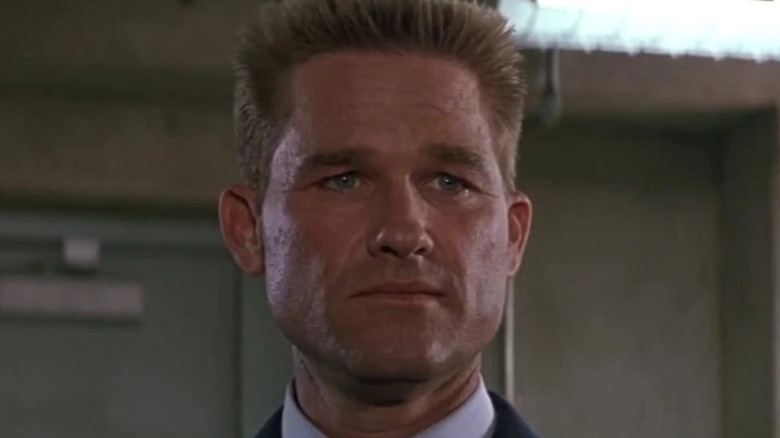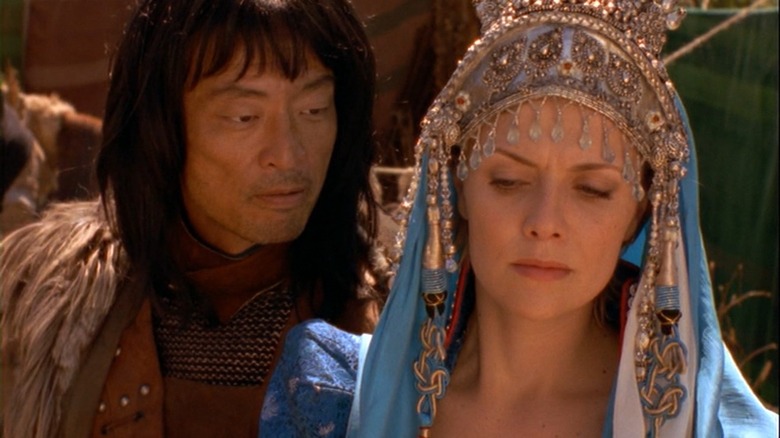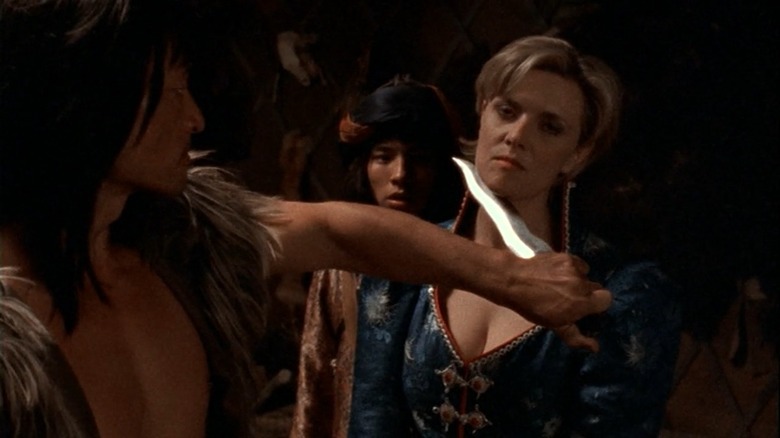The Stargate Scene That Aged Poorly
Originally premiering in 1994, the "Stargate" franchise is a time-honored classic among sci-fi fans. Encapsulating several movies, TV series, and other media, the franchise got its kicks following in the footsteps of "Star Trek" by focusing on humanity's exploratory forays into other star systems (albeit, by way of the Stargate and not spaceships). Nevertheless, after all this time much of the franchise is beginning to show its age. After all, it is no spring chicken. Over two and a half decades of technological advancement have rendered much of its effects, both computer-generated and practical, obsolete.
However, fans have historically been able to overlook such things as long as the writing makes up for it. Luckily, in the case of "Stargate," this is often the case, and episodes in the franchise aren't often considered outdated from a writing standpoint. That being said, there is one instance where the story in "Stargate" hasn't aged so well.
'Emancipation' gets so much wrong historically and thematically
Season 1, Episode 4 ("Emancipation") of the first TV series, "Stargate SG-1," is routinely panned as one of the franchise's worst episodes, and it has more than one scene that aged poorly.
On paper, the core idea for "Emancipation" sounds like it could work. The SG-1 team discovers a distant planet populated by a race of humans descended from our own medieval Mongolian Empire. Their society is extremely patriarchal and treats women as commodities to be traded. They soon kidnap the team's only female, Captain Samantha Carter (Amanda Tapping), and force her to work under their unjust regime before Carter bests the chief in combat and earns her freedom. However, there is one key area where the episode's concept falls apart — and one scene that is bound to make many people extremely uncomfortable.
For starters, the episode does a pretty poor job at accurately representing the Mongol Empire, which generally granted women more rights than many other societies at the time (via World History Encyclopedia). They could own property and were elevated to positions of power under the right circumstances. They were generally not viewed purely as property.
The real icing on the cake, though, is how uncomfortable certain scenes are between Captain Carter and the Shavadai (what the alien Mongols call themselves) leader, Turghan. Though these scenes, while never exceptionally graphic, get extremely uncomfortable. A stand-out in this case is when, as a way of establishing dominance over Carter, Turghan forcefully kisses her. Granted, Turghan gets his comeuppance when Carter beats him in a duel, but the moment itself is still enough to make one's skin crawl.
Carter's characterization is way off
As you might have been able to glean from her victory over Turghan, Captain Carter isn't exactly a pushover. She says it herself in the episode, she is a warrior and a scholar, and not someone who should be trifled with. Yet one misstep that "Emancipation" repeatedly makes is having Carter do nothing even when she has the opportunity to escape. The best example of this comes when the teenage Shavadai, Abu, informs her that he is going to sell her into slavery. For some reason, Carter simply accepts this fact even though she could easily overpower the child.
"The Sam we know could have freed herself from the boy, but, then again, Sam really wasn't Sam in that episode," wrote Reddit user u/Lurkerlisk in a thread discussing the episode. "Her dialogue and the actions of the entire team were frustrating and out of character."
"She's more than a match for this kid," wrote the original poster. "Sure he has a knife and she is tied up, but he's already (stupidly) told her his whole plan. She knows he needs her alive for his plan to work. She has a surprising amount of power in this situation, given the circumstances."
In the end, "Emancipation" ends up messier than it should have been. With inaccurate portrayals of history, uncomfortable moments, and bad characterization, there's a reason it goes down in history as one of the worst "Stargate" episodes.


